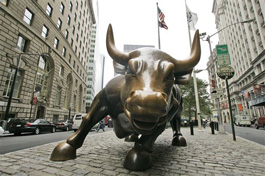| Home | Blog | Ask This | Showcase | Commentary | Comments | About Us | Contributors | Contact Us |

How many more crashes before we fix the economy?COMMENTARY | December 357, 2011Some lessons were learned from the 2008 economic collapse but few reforms have been implemented; moneyed resistance is too powerful and stubborn. So a good question is: When will we fix the system? After the next crisis? The one after that? We sure aren’t fixing it now. By Martin Lobel Some observers, including some political leaders, have learned from the 2008 crisis – but not enough have. Palliative reforms were passed but instead of being implemented they are, mostly, being thwarted. So the question as we move into 2012 is: When the next crisis occurs, will we have learned our lesson? Will we fix the system after that? Because we aren’t fixing it now. Wall street is still using derivatives to increase rewards and risks without any effective supervision. There are about $300 trillion of derivatives floating around and no one has any idea of what the net risk is. Nor, because of these derivatives, repos and other esoteric financial instruments, do we know what our banks’ exposure is to the European banks. Almost all of the European banks are on the brink of disaster because, if they had to mark to market all the sovereign debt they hold, they would not have sufficient capital to survive without more massive government subsidies, which may not be forthcoming. The Dodd-Frank bill is supposed to curb some of the more risky financial activities by increased regulatory supervision, rather than structural reform. Unfortunately, rather than push to implement regulatory supervision to make sure that their counter parties are sound, our financial institutions are deploying battalions of lawyers and lobbyists to slow down implementation of any reform. Not surprisingly, they are not debating the need for reform, they are quibbling over any administrative issue they can conceive of to delay any reform and they are doing it at the administrative level where no one, except perhaps the trade press, is watching. Wall Street is counting on the Republicans in Congress to eviscerate real reform. They are cutting enforcement budgets, refusing to confirm appointees and proposing legislation to protect Wall Street from any serious reform. The Democrats aren’t much better, reliant as they are on Wall Street for a large portion of their campaign contributions. The Occupy Wall Street protesters and their sympathizers know they are being hurt economically and that Wall Street is in partly responsible. Unfortunately, they don’t seem to have the political or economic sophistication to force Congress and the White House to push for the kind of structural reforms that we need to insure that we won’t have another economic collapse. The ultimate irony is that the tea party supporters are fighting against the same financial pressures but have adopted “reforms” suggested by some very rich conservatives that will hurt the middle class. Given the White House’s refusal to press for real structural reforms of Wall Street and the banks, the Republicans’ attempts to roll back what reforms were enacted, the public’s confusion about what needs to be done to rectify the economic situation adversely affecting the overwhelming number of voters, and the press’s failure to inform the public about what needs to be done, the chances of avoiding another economic crisis are slim at best. Most likely the trigger will be in Europe. When the crisis occurs we need to have ready some real reforms of our financial and tax systems because that is when the public, the press and the politicians will be most likely to respond to what the middle class needs rather than what the moneyed interests want. We need to reform the tax code to make it simpler and fairer. What is the justification for taxing income from investments at a lower rate than income from labor? What is the justification for tax subsidies encouraging the export of profits and jobs from the United States? These are vital questions, too long shunted aside by lawmakers and ignored by the press. Everyone recognizes the need to reform our tax code, but those who benefit from these hidden subsidies will keep them until the public understands them and is focused on reforming the tax code, i.e. when we have our next economic crisis. We also need to reform Wall Street and the big banks by enforcing the fiduciary responsibilities of their board members. There is nothing like personal liability to make sure people exercise their responsibility properly. When Wall Street firms were partnerships and the partners own money was at stake, no one had the 32 to 1 risk ratio of Lehman Brothers when it collapsed. We also need to break up those that are too big to fail. If they are too big to fail, they are too big to exist without implicit government guarantees. We need, once again, to separate investment banks which risk their own money from banks which rely on government-insured depositors money. We need to return to the days when the function of banks was to collect money and invest it in productive activity. We can no longer allow the banks and investment houses to use other people’s money to spin off esoteric derivatives whose only function seems to be to generate huge profits for their creators. None of this will happen until the next crisis and we have leaders who are willing to stand up to their largest contributors and tell them what must be done to prevent yet another crisis with even more serious consequences than the last one.
|
||||||||||||||




